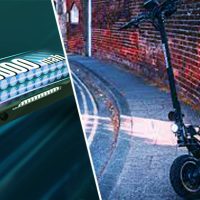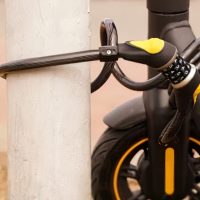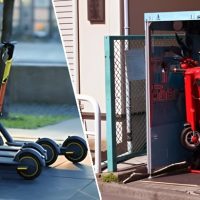As electric scooters continue to revolutionize urban mobility, riders often question the safety of these futuristic marvels. With concerns centered around battery technology, it’s crucial to address the safety question: Are electric scooter batteries truly safe? Delving into the world of electric scooters, we uncover the captivating engineering and robust safety measures beneath the sleek exteriors. From cutting-edge battery management systems to thermal protection features, follow us to discover the safety shield guarding electric scooter batteries and providing peace of mind to every adventure-seeking rider.

Are electric scooter batteries safe?
Electric scooter batteries are designed with safety as a top priority, making them generally safe for use. They incorporate various safety features to ensure reliable performance and minimize risks.
One commonly used battery type is lithium-ion (Li-ion) batteries, known for their high energy density and efficiency. Li-ion batteries feature built-in safeguards such as thermal management systems, protection against overcharging, and voltage monitoring to prevent overheating and excessive discharge.
These safety mechanisms minimize the chances of fire or explosion. Also, advancements in battery management systems allow for better control and monitoring of battery conditions. It’s important to follow manufacturer guidelines, practice proper charging habits, and use certified chargers to maintain the safety of electric scooter batteries.
While no battery is entirely risk-free, implementing these safety features makes electric scooter batteries safe for riders when used responsibly.
Does overcharging damage the electric scooter battery?
Overcharging can indeed damage an electric scooter battery. Lithium-ion (Li-ion) batteries have a specific voltage range within which they should be charged. Exceeding this range by overcharging can lead to detrimental effects like decreased battery capacity and shortened lifespan.
The charging time for electric scooter batteries varies depending on their capacity and the charger’s power output. For example, let’s consider a 36V electric scooter battery with a capacity of 10Ah and a charger with an output of 2A. To calculate the charging time, you can divide the battery capacity by the charger’s output:
- Charging time = Battery capacity / Charger output
- Charging time = 10Ah / 2A
- Charging time = 5 hours
It would take approximately 5 hours to fully charge the 36V, 10Ah battery using a 2A charger.
It’s important to use the charger the manufacturer provides or a compatible one to ensure safe and optimal charging for your specific electric scooter battery.
Lead acid vs. lithium battery? Which is safe for electric scooters?
Regarding safety, lithium-ion (Li-ion) batteries are generally considered safer than lead-acid batteries for electric scooters. Here’s a comparison of the two battery types.
Safety
Li-ion batteries have built-in safety features such as thermal management systems, voltage monitoring, and protection against overcharging and short circuits. These features help prevent overheating and reduce the risk of fire or explosion.
On the other hand, lead-acid batteries are more prone to leaks, spills, and release of toxic gases, making them less safe in comparison.
Weight and Size
Li-ion batteries are significantly lighter and more compact than lead-acid batteries, making them more suitable for electric scooters where weight and space are crucial factors.
Energy Density
Li-ion batteries offer higher energy density, meaning they can store more energy in a smaller, lighter package. It provides electric scooters with longer ranges and improved performance compared to lead-acid batteries.
Lifespan and Efficiency
Li-ion batteries have a longer lifespan and higher efficiency than lead-acid batteries. They can handle more charge cycles and maintain a consistent voltage output over time.
Does a lead acid battery take longer to charge than lithium-ion batteries?
Lead-acid batteries take longer to charge compared to lithium-ion (Li-ion) batteries. The charging time for lead-acid batteries is influenced by several factors, including their capacity, state of charge, and the charging rate applied.
Lead-acid batteries have a slower charging rate due to their chemical composition and internal resistance, and they often need a longer charging time to reach full capacity. Charging a lead-acid battery can take several hours or even overnight, depending on its size and the charger’s output.
On the contrary, Li-ion batteries have a higher charging efficiency and can accept a faster charging rate, and they charge more quickly than lead-acid batteries. Li-ion battery charging times vary depending on battery capacity, charger output, and the battery management system’s capabilities.
Overall, Li-ion batteries offer faster charging times than lead-acid batteries, making them more convenient for electric scooter users who prefer shorter charging periods.
Which battery has overheating issues in an electric scooter?
Lithium-ion (Li-ion) batteries used in electric scooters have a higher likelihood of overheating compared to lead-acid batteries. While Li-ion batteries offer numerous advantages, including higher energy density and longer lifespan, they can be more susceptible to overheating if not handled properly.
The risk of overheating in Li-ion batteries is primarily due to overcharging, high ambient temperatures, physical damage, or manufacturing defects.
Overcharging, especially with incompatible chargers or leaving the battery connected to the charger for an extended period, can lead to excessive heat buildup.
Exposing Li-ion batteries to extreme temperatures or subjecting them to physical stress can also increase the risk of overheating.
It’s important to follow proper charging practices, use compatible chargers, and avoid exposing Li-ion batteries to extreme temperatures to mitigate the risk of overheating and ensure the safe operation of electric scooters.
- Which is more powerful, lead acid or lithium-ion battery?
Lithium-ion (Li-ion) batteries are generally more powerful than lead-acid batteries in electric scooters. Take a look at these reasons why Li-ion batteries are considered more powerful.

Energy Density
Li-ion batteries have a higher energy density. They can store and deliver more energy in a smaller and lighter package compared to lead-acid batteries. Such higher energy density translates to increased power output and improved performance for electric scooters.

Voltage Stability
Li-ion batteries maintain a more consistent voltage output throughout their discharge cycle, ensuring a more steady and powerful performance. Lead-acid batteries experience voltage drops as they discharge, leading to a gradual decrease in power output.
Higher Discharge Rates
Li-ion batteries can handle higher discharge rates, allowing electric scooters to deliver more power when accelerating or climbing inclines. Due to their internal resistance, lead-acid batteries may struggle to provide the same power output level.
While lead-acid batteries have been traditionally used in some electric scooters and offer certain advantages, such as lower cost, Li-ion batteries provide a more powerful and efficient solution, making them the preferred choice for modern electric scooters.
Final words:
Electric scooter batteries are designed with paramount safety in mind. With robust built-in safety features, such as thermal management systems and protection against overcharging or short circuits, these batteries offer reliable and secure performance. While responsible usage, following manufacturer guidelines, and proper charging practices are essential, electric scooter batteries can be enjoyed confidently, providing a safe and exhilarating ride for all enthusiasts.
Frequently Asked Questions (FAQs)
- How do electric scooter batteries prevent overcharging and overheating?
Electric scooter batteries have built-in protection mechanisms to prevent overcharging and overheating. These mechanisms include advanced battery management systems (BMS) that monitor the battery’s voltage, current, and temperature. Once the battery reaches its maximum charge level or exceeds safe temperature thresholds, the BMS automatically cuts off the charging process to prevent overcharging and overheating.
- Can electric scooter batteries explode or catch fire?
It is rare as electric scooter batteries have the potential to explode or catch fire if they are damaged, mishandled, or subjected to extreme conditions. The risk is mitigated through stringent safety standards and design features implemented by manufacturers.
- How long do electric scooter batteries typically last before needing replacement?
Electric scooter batteries can last 2 to 5 years or approximately 300 to 500 charge cycles. Remember, battery performance gradually diminishes over time.
Arnold A. Jones: Your go-to source for electric scooters, hoverboards, and skateboards! Riding enthusiast and expert sharing tips, trends, and insights for riders of all levels. Stay in the know with Arnold’s expertise.







Leave a Reply